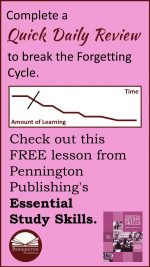Learn How to Study
Learning how to study is a skill that must be taught, not just caught. What seems to be simply a matter of common sense is not common sense at all. Avoiding the edge of a cliff on a windy day is common sense; knowing how to create vocabulary flash cards, practicing them, and committing the words and meanings to memory is not. The process must be taught, practiced, and learned to mastery.
So often parents or teachers assume that someone else must have taught a child to study, so they avoid the basic instruction. No wonder children have instructional gaps!
In this article we’ll explore why learning must be practiced soon after it is acquired to move the short-term learning into the long-term memory. Memory practice is an essential study skill and is backed by plenty of psychological studies.
According to Alexandra M. Murray, Anna C. Nobre, Ian A. Clark, André M. Cravo, and Mark G. Stokes in a research study on restoring discrete items to the short-term visual memory:
The authors suggest that selective attention during the maintenance of a memory can turn it from one that is relatively weak into one that is more robust, which allows for access to information that would otherwise be forgotten (https://www.psychologicalscience.org/news/releases/new-research-on-memory-from-psychological-science-2.html).
Memory research tells us that we remember up to 70% of new information if that information is practiced withing 24 hours. If we don’t reinforce what has been learned soon after learning, we rapidly forget what has been taught. We need to end the “forgetting cycle for your child (or your students).” Here’s how to help your child learn how to study.
Quick Daily Review
Every day after school or work, teach your child (or students) to complete a ten-minute review of any notes, worksheets, reports, memos,and assignments that you worked on in that day. This review interrupts the “forgetting cycle” and will help you prepare in advance for tests, meetings, or discussion.
Memory research tells us that people remember up to 70% of new information only if that information is practiced and placed into the long-term memory within the first 24 hours after first learning that information. The level of retention drops to only 10% after one week. So, build in to your daily routine a review time soon after school or at the end of work every day. A little bit of review, rehearsal, and study with a Daily Review will actually save you time studying or preparing for the night before the test or business presentation.
Purchase a spiral-bound notebook for each school subject. Label each notebook, according to the subject. Write the date of your Daily Review at the top of page and list the key areas of focus for that subject or class on that day. Write possible test questions, discussion points, questions for further research, and memory tricks to remember key ideas and details for the most important content learned that day on small sticky notes and arrange them on the Daily Review page. A few nights before an upcoming test or business meeting, you can transfer the sticky notes to a study sheet and use them to create a practice test or presentation. Also, don’t forget sticky notes that you used to take marginal annotations on worksheets, articles, and from your textbook, articles, memos, or reports.
A Few Tips for Writing Memorable Sticky Notes
1. People remember information best when that information is organized in a structured manner.
Tip: Organize your sticky notes into distinctly memorable patterns. Try general to specific, alphabetical, and chronological patterns. Color code categories with different color stickies. For example, if you are studying the explorers you could use blue for people, yellow for their countries, green for their areas of exploration, and pink for their accomplishments.
2. People remember information that is connected to visual imagery.
Tip: Draw out quick graphic or picture representations of key ideas on your stickies.
3. People remember events and information that are made exciting, interesting, or even embarrassing.
Tip: Personalize what you are trying to remember to keep things more memorable on your stickies. Relate the information that you want to remember to events and people in your own life.
The author’s Essential Study Skills is the study skill curriculum that teaches what students need to know to succeed and thrive in school. Often, the reason why students fail to achieve their academic potential is not because of laziness or lack of effort, but because they have never learned the basic study skills necessary for success. The 56 lessons in Essential Study Skills will teach your students to “work smarter, not harder.” Students who master these skills will spend less time, and accomplish more during homework and study time. Their test study will be more productive and they will get better grades. Reading comprehension and vocabulary will improve. Their writing will make more sense and essays will be easier to plan and complete. They will memorize better and forget less. Their schoolwork will seem easier and will be much more enjoyable. Lastly, students will feel better about themselves as learners and will be more motivated to succeed.
Essential Study Skills is the ideal curriculum for study skill, life skill, Advocacy/Advisory, and Opportunity Program classes. The easy-to-follow lesson format of 1. Personal Assessment 2. Study Skill Tips and 3. Reflection is ideal for self-guided learning and practice. Contact the publisher for affordable site licenses.

